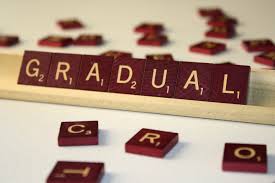记忆方法
将“gradual”分解为“grad”和“ual”。联想“grad”像阶梯一样逐渐上升,而“ual”表示性质或状态,因此“gradual”可以想象为像阶梯一样逐渐变化或发展的过程。
以上内容由AI生成, 仅供参考和借鉴
英语词源
- gradual
-
gradual: [16] Latin grādus ‘step’ has been a remarkably prolific source of English words. Beside grade [16] itself, it has contributed the derivatives gradation [16], gradient [19], gradual (from medieval Latin graduālis, literally ‘proceeding by steps’), graduate [15], and retrograde [14]. The derived verb gradī ‘walk, go’ has produced ingredient, and its past participial stem gress- has given, among others, aggression, congress, digress [16], progress [15], and transgress [16].
And degrade and degree are of the same parentage, the latter filtered through Old French. The origins of Latin grādus itself are not known.
=> aggression, congress, degrade, degree, digress, grade, gradient, ingredient, progress, transgress - gradual (adj.)
- early 15c., "having steps or ridges," from Medieval Latin gradualis, from Latin gradus "step" (see grade (n.)). Meaning "arranged by degrees" is from 1540s; that of "taking place by degrees" is from 1690s.
权威例句
- 1. The roads are built to accommodate gradual temperature changes.
- 修建这些道路时考虑到了温度的逐渐变化。
- 2. He hopes for a gradual disconnection from the federation.
- 他希望能从联盟中逐渐抽身而出。
- 3. The greatest hope for reform is the gradual spread of information.
- 对改革的最大希望是信息能得以逐渐传播。
- 4. Weaning should be a gradual process.
- 断奶要一步步来。
- 5. a gradual change in the climate
- 气候的逐渐变化
